
Tarzan is a rock musical theatre based on the Walt Disney Animation Studios 1999 film of the same name, with music and lyrics by Phil Collins, and a book by David Henry Hwang. The musical follows Tarzan, who is raised by gorillas in West Africa. He meets Jane, a young English naturalist, and falls in love, unknowing that Jane's entourage plans to kill the gorillas.
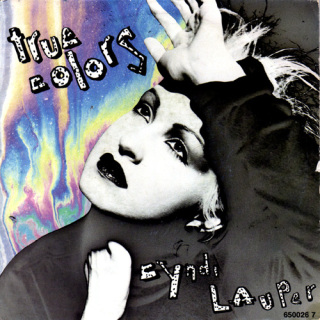
"True Colors" is a song written by American songwriters Billy Steinberg and Tom Kelly. It was both the title track and the first single released from American singer Cyndi Lauper's second studio album of the same name (1986). Released in mid-1986, the song would become a hit for Lauper, spending two weeks at number one on the US Billboard Hot 100, becoming her second and last single to occupy the top of the chart. It received a Grammy Award nomination for Best Female Pop Vocal Performance.

"Easy Lover" is a song performed by Philip Bailey of the band Earth, Wind & Fire and Phil Collins of the band Genesis, jointly written and composed by Bailey, Collins, and Nathan East. The song appears on Bailey's solo album, Chinese Wall. Collins has performed the song in his live concerts, and it appears on both his 1990 album, Serious Hits... Live!, and his 1998 compilation album, ...Hits. It is Bailey's only US Top 40 hit as a solo artist.
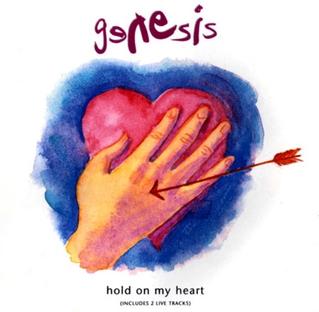
"Hold on My Heart" is a song by English rock band Genesis from their 14th studio album, We Can't Dance (1991). The ballad was released as the album's third single on 6 April 1992. The song reached number one on the Canadian RPM 100 Hit Tracks chart, the RPM Adult Contemporary chart, and the US Billboard Adult Contemporary chart, as well as number 12 on the Billboard Hot 100. In the band's home country, the song peaked at number 16 on the UK Singles Chart.

"Separate Lives" is a 1985 song recorded by Phil Collins and Marilyn Martin and featured on the soundtrack to the motion picture White Nights. It reached No. 1 on the US Billboard Hot 100 and Adult Contemporary charts as well as in Canada and Ireland. It reached No. 4 on the UK Singles Chart, and was certified silver by the British Phonographic Industry.

"Where Does My Heart Beat Now" is a song performed by Canadian recording artist Celine Dion for her ninth studio album and debut English-language album, Unison (1990). It was released by Columbia Records as the third single from Unison in Canada on 1 October 1990. It was also issued as the lead single in the United States in late 1990, and in other parts of the world in early 1991. "Where Does My Heart Beat Now" was written by Robert White Johnson and Taylor Rhodes in 1988, and recorded by Dion one year later. The song was produced by Christopher Neil. Dion premiered the song at the Eurovision Song Contest 1989 in Switzerland, where she performed it along with her 1988 winning song, "Ne partez pas sans moi".
"The Last to Know" is a song by Scottish singer Sheena Easton, inluded on her 1987 album, No Sound But a Heart. It was written by Brock Walsh and Phil Galdston, and produced by Nick Martinelli. Easton's album was not commercially successful and songs from No Sound But a Heart were later covered by other artists. "The Last to Know" was recorded by Canadian singer Celine Dion for her 1990 English-language debut album, Unison.

"Don't Rush Me" is a song written by Alexandra Forbes and Jeff Franzel and performed by American singer-songwriter and actress Taylor Dayne. It was produced by Ric Wake and released in the late summer of 1988 by Arista as the fourth single from Dayne's debut album, Tell it to My Heart (1988). The cover art of the single was used on the reissue of the album.
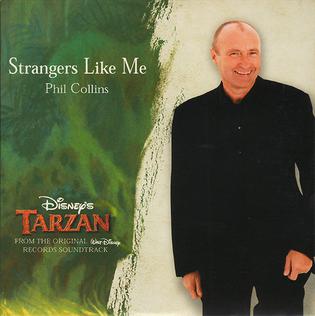
"Strangers Like Me" is a song by the English drummer Phil Collins for the soundtrack of Disney's 1999 animated film Tarzan. The song peaked at number ten on the U.S. Billboard Hot Adult Contemporary Tracks chart and received highly positive reviews. Collins also recorded the song in Spanish, Italian, French and German.

Tarzan: An Original Walt Disney Records Soundtrack is the soundtrack for the 1999 Disney animated feature film, Tarzan. The songs on the soundtrack were composed by Phil Collins, and the instrumental score by Mark Mancina. The song "You'll Be in My Heart" won both the Academy Award for Best Original Song and the Golden Globe Award for Best Original Song and received a Grammy Award nomination for Best Song Written for a Motion Picture, Television or Other Visual Media, while the soundtrack album won a Grammy Award for Best Soundtrack Album. For his contribution to the soundtrack, Collins received an American Music Award for Favorite Adult Contemporary Artist.

"Rhythm of My Heart" is a song written by Marc Jordan and John Capek that was first recorded by Dutch rock and roll artist René Shuman, included on his 1986 self-titled debut album. In 1991, British singer Rod Stewart recorded the song for his album Vagabond Heart with production by Trevor Horn. It is the album's opening track and was released as its second single on 4 March 1991 by Warner.

"Almost Paradise... Love Theme from Footloose" is the title of a duet sung by Mike Reno of Loverboy and Ann Wilson of Heart. It is one of several major hits written by singer Eric Carmen with lyricist Dean Pitchford, another being "Make Me Lose Control".

"Something Happened on the Way to Heaven" is a song by English drummer Phil Collins, released in April 1990 from his fourth studio album, ...But Seriously (1989). The song peaked at No. 4 on the US Billboard Hot 100 the week of October 6, 1990 and No. 15 on the UK Singles Chart. A live version also appears on the Serious Hits... Live! album. The song is often identified by the recurring hook of "How many times can I say 'I'm sorry'?", however, the title of the song is essentially the 2nd line of the 2nd verse.

"Do You Remember?" is a song by the English drummer and singer-songwriter Phil Collins. It was released in April 1990 as the fourth single from his fourth solo studio album ...But Seriously. It was produced by Collins and Hugh Padgham and features singer-songwriter Stephen Bishop on the track as a backing vocalist. The song had minor success in European countries but went to number one on both the Canadian and US Adult Contemporary charts. It also peaked at number four on the US Billboard Hot 100, becoming his 14th and last top-ten hit.

"My Melody of Love" is the title of a popular song from 1974 by the American singer Bobby Vinton. Vinton adapted his song from a German schlager song composed by Henry Mayer, and it appears on Vinton's album Melodies of Love. The song was also recorded by Spanish pop singer Karina as "Palabras de Cristal".
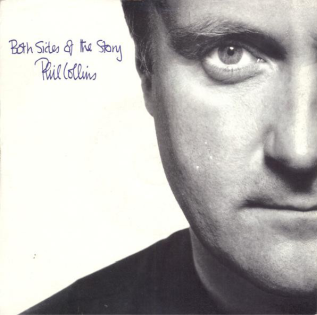
"Both Sides of the Story" is a song performed by English singer-songwriter, drummer, actor and lead singer of English rock band Genesis, Phil Collins. The song was released in October 1993 by Virgin, WEA and Atlantic as the lead single from his fifth album, Both Sides (1993). The song reached number seven on the UK Singles Chart, and numbers 25 and 20 on the US Billboard Hot 100 and Cash Box Top 100. It charted the highest in Canada, peaking at number two on the RPM Top Singles chart. The single's B-sides vary, as copies of the single include either "Always" or "Rad Dudeski".
"My Boy" is a popular song from the early 1970s. The music was composed by Jean-Pierre Bourtayre and Claude François, and the lyrics were translated from the original version "Parce que je t'aime, mon enfant" into English by Phil Coulter and Bill Martin.
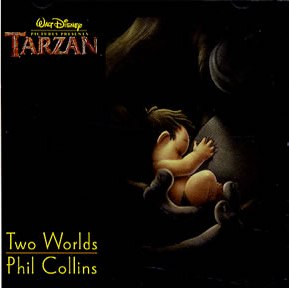
"Two Worlds" is a song by English drummer and singer Phil Collins that serves as the main theme for Disney's 1999 film Tarzan and appears four times on the film's soundtrack.

"You'll Never Get to Heaven (If You Break My Heart)" is a song composed by Burt Bacharach, with lyrics by Hal David. It was originally recorded by Dionne Warwick in 1964, who charted at number 34 in the US Billboard Hot 100 with her version. It was covered by the Stylistics in 1973, who reached number 23 in the US with their cover.


















